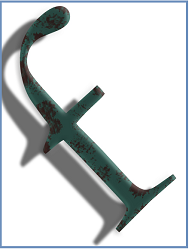USES OF DIGITAL TECHNOLOGIES IN ENGLISH LANGUAGE LETTERING PRACTICES BY HIGH SCHOOL STUDENTS
DOI:
https://doi.org/10.22481/folio.v12i1.6160Keywords:
Internet, jogos online, língua inglesa.Abstract
Digital technologies are daily in people's lives and have been contributing to learning other languages. The aim of this paper is to understand the use of digital technologies in English language literacy practices by high school students. Through social network screenshots and game chat, as well as semi-structured group interviews. It was possible to analyze interactions of high school students with colleagues from other countries, positions about the use of English in and out of school, as well as evidence of school conditions of English language teaching. Data analysis is based on approaches to literacy studies and digital technologies, which recognize the value of new technologies not only in the classroom but also in vernacular practices. For the research subjects, learning that takes place within the virtual environment, specifically in online games, is characterized as autonomous and interactive, while classroom practices are perceived as providing the opportunity to learn standard English writing. However, although students point to the school and the internet as distant, subjects do not deny the school's contributions to English language learning, but do not establish a link between vernacular online gaming practices and dominant school practices.
Downloads
References
2. BAILLY, Sophie. Supporting Autonomy Development in Online Learning Environments: What Knowledge and Skills do Teachers Need? In: VILLANUEVA, M.; RUIZ, M.-N.; LUZON, J. (Ed.) Genres Theory and New Literacies: Applications to Autonomous Language Learning. Cambridge: Cambridge Scholars Publishing, 2010.
3. BARTLETT, Lesley. To seem and to feel: situated identities and literacy practices. Teachers College Record, Columbia University, v. 109, n. 1, p. 51-69, january 2007.
4. BARTON, David; HAMILTON, Mary. Literacy practices. In: Barton, David. et al. Situated literacies: reading and writing in context. London: Routledge, 2000.
5. BARTON, David; LEE, Carmen. Linguagem online: textos e práticas digitais. São Paulo: Parábola Editorial, 2015.
6. BENSON, Phil. Teaching and Researching Autonomy in Language Learning. Harlow: Longman/Pearson Education, 2001.
7. BOGDAN, Robert; BIKLEN, Sari. Investigação Qualitativa em Educação: uma introdução à teoria e aos métodos. Porto: Porto Editora, 1994.
8. CASSANY, Daniel. “Leer y escribir literatura al margen de la ley", en CILELIJ [I Congreso Iberoamericano de Lengua y Literatura Infantil y Juvenil]. Actas y Memoria del Congreso. Madrid: Fundación SM / Ministerio de Cultura de España. 2010. p. 497-514.
9. CASSANY, Daniel; HERNÁNDEZ, Denise. ¿Internet: 1; Escuela: 0?. CPU-e, Revista de Investigación Educativa, 14, enero-junio 2012.
10. COSCARELLI, Carla Viana. A leitura em múltiplas fontes: um processo investigativo. Ens. Tecnol. R., Londrina, v. 1, n. 1, p. 67-79, jan./jun. 2017.
11. GEE, Jean Paul. Progressivism, critique, and socially situated minds. In C. Dudley Marling and C. Edelsky, eds, The fate of progressive language policies and practices. Urbana, IL: NCTE, 2001.
12. GEE, Jean Paul. Learning and games. In: The ecology of games: conencting youth, games, and learning. Foundation Series on Digital Media and Learning. Cambridge, MA: The MIT Press, 2008.
13. HEATH, Shirley Brice. What no bedtime story means: narrative skills at home and school. In: Duranti, A. (Org.) Linguistic anthropology: a reader. Oxford: Blackwel, 2001.
14. HOLEC, Henri. L'apprentissage autodirigé: une autre offre de formation. Le Français dans le Monde, juin. 1998.
15. KLEIMAN, Ângela. Professores e agentes de letramentos: identidade e posicionamento social. Revista Filologia e Linguística Portuguesa, n. 08, 2007. p. 409-424.
16. LEFFA, Vilson. Redes sociais: ensinando línguas como antigamente. In: ARAÚJO, J.; LEFFA, V. Redes sociais e ensino de línguas. São Paulo: Parábola Editorial, 2016.
17. PAHL, Kate; ROWSELL, Jennifer. Literacy and Education: Understanding the New Literacy Studies in the classroom. London: Paul Chapman Publising/SAGE Publications Company. 2005.
18. PALFREY, John; GASSER, Urs. Nascidos na era digital: entendendo a primeira geração dos nativos digitais. Porto Alegre: Artmed, 2011.
19. PRENSKY, Marc. Digital game-based learning. St. Paul: Paragon House Edition, 2007.
20. ROJO, Roxane. Letramentos múltiplos, escola e inclusão social. São Paulo: Parábola. Editorial, 2009.
21. STREET, Brian. Literacy in theory and practice. Cambridge: Cambridge University Press, 1984.
22. TORI, Romero. Educação sem distância: as tecnologias interativas na redução de distância em ensino e aprendizagem. São Paulo: Editora Senac São Paulo, 2010.
23. VALERO, Maria José; VÁZQUEZ, Boris; CASSANY, Daniel. Desenredando la web: la lectura critica de los aprendices de lenguas extranjeras em entornos digitales. Ocnos, n. 13, p. 7-23, 2015.
24. WHITE, David; CORNU, Alison Le. Visitors and Residents: A new typology for online engagement. Revista First Monday, vol. 16. N. 09. 2011.
Downloads
Published
Issue
Section
License












